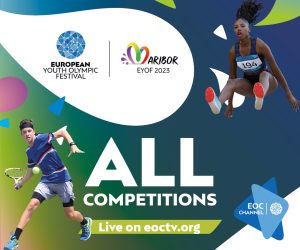 NEWS
NEWS

European Games volunteers – The unsung heroes
26 June 2019
With hundreds of sports competitions under their belt, Anatoli Yanochkin from Russia and Judith Gunion from Great Britain are two of the most experienced individuals among the 7,800 volunteers at the European Games Minsk 2019. They spoke to the EOC about what drives them and the positives of being a crucial component to organising a sports event.
Needless to say, 80-year-old Anatoli Yanochkin and 72-year-old Judith Gunion are no typical retirees. These days, they dedicate most of their time to volunteering, and it appears they are not planning on slowing down any time soon.
A former engineer, Yanochkin made his volunteering debut in 2012, when he started his training for the Olympic Winter Games Sochi 2014. He says he was intrigued by an advertisement he saw on TV and immediately felt persuaded to apply for the role.
“I went online and searched for the correct website to register. Then I passed all the [necessary] language tests and worked several hours at the volunteering centre in Moscow prior to the 2014 Olympic Games,” he explains.
Since then, Yanochkin has been volunteering at various sports events 15 to 20 times per year. His repertoire includes sports competitions of the highest calibre, such as the Formula 1 in Sochi, 2018 FIFA World Cup in Russia, the Olympic Winter Games PyeongChang 2018 as well as countless other national sports competitions.
His motivation behind volunteering is simple: “I enjoy being part of events that a person wouldn’t normally be able to attend,” he explains.
“As a spectator, you buy a ticket and visit one event, but as a volunteer you get to spend [more time] there and see all the behind-the-scenes things.”
Having witnessed a variety of sports competitions, Yanochkin, who is working with the anti-doping control team, is impressed with the execution of the European Games in Minsk so far. The level of organisation, he admits, is just as good as any other big sports competition.
Former journalist and sports massage therapist Judith Gunion is no newbie to the sports world either. A mixed-zone specialist here in Minsk, she has been enjoying being close to the action at the European Games, and hopes that they will continue on in the future.
“I’d never been to Minsk, and I don’t speak Russian, but I am able to talk to people. I’m loving the whole atmosphere of it.”
Gunion’s first volunteering job was at the Olympic Games London 2012, followed by countless World Championships and the Olympic Games Rio 2016. Having been diagnosed with breast cancer three times since 2000, there are no more plan Bs for the 72-year-old.
“I’ve got the spirit, I’ve got the desire,” she says enthusiastically. “I get tired, obviously, I’m the first to admit it. When I go home after this, I will be tired for a couple of days, but that’s what happens. I get over it, and I am ready for the next [day].”
Just like Gunion, Yanochkin has always had a tendency to be active, refusing to spend his time “playing cards or gardening.”
An accomplished alpinist, Yanochkin used to organise expeditions all over the former Soviet Union and worked as a ski instructor for many years. His profession allowed him to see the world, bringing him to the most remote places, including Antarctica, where he spent two and a half years researching at a Soviet meteorological station. Years of travelling have filled his life with countless adventures, but also unavoidable moments of terror.
“In 1981, I went on an expedition to the Arctic, and our plane crashed while landing, leaving two out of 12 people dead,” he remembers. Ironically, Yanochkin survived because he was not wearing a seat belt.
“The two people sitting next to me were smothered to death, and I was thrown in the air from my seat and broke both legs,” he explains. Since then, Yanochkin has been walking with a limp. Decades after the accident, the effects of the crash still linger, but the physical setback does not hold him back.
“All sportsmen have some sort of trauma, but what to do? We keep on living!”
After the European Games, Yanochkin plans to steer his attention towards local events in Moscow later this year, such as the Moscow Urban Forum, which features panel discussions with architects and urban managers from all over the world.
Judith, on the other hand, will be en route to Peru next month to volunteer at the Pan American Games 2019. “I’ve never been to Peru, so it’s a wonderful opportunity to do something like this,” she says.
After years of valuable hands-on experience, one question remains: What makes a good volunteer? “You have to be kind, polite and ready to face any unexpected circumstances,” says Yanochkin. Gunion only echoes his words, while emphasising the importance of team spirit.
“I just want to be part of a team. I want the athletes and the spectators to go home thinking they had a great time.”















